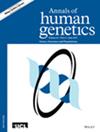多家系全基因组关联研究荟萃分析方法。
IF 1.2
4区 生物学
Q4 GENETICS & HEREDITY
引用次数: 0
摘要
全基因组关联研究(GWAS)大大提高了我们对复杂疾病遗传基础的认识。尽管技术不断进步,但我们的认识仍然存在差距,部分原因是效应大小较小和遗传变异覆盖面不足。多基因组 GWAS 元分析(MAGMA)通过整合来自不同人群的遗传数据来应对这些挑战,从而提高了检测基因座的能力,并提高了精细图谱的分辨率,以识别不同祖先群体的因果变异。本综述概述了 MAGMA 的协议、统计方法和软件,并强调了与这种方法相关的一些挑战。本文章由计算机程序翻译,如有差异,请以英文原文为准。
Methods for multiancestry genome-wide association study meta-analysis
Genome-wide association studies (GWAS) have significantly enhanced our understanding of the genetic basis of complex diseases. Despite the technological advancements, gaps in our understanding remain, partly due to small effect sizes and inadequate coverage of genetic variation. Multiancestry GWAS meta-analysis (MAGMA) addresses these challenges by integrating genetic data from diverse populations, thereby increasing power to detect loci and improving fine-mapping resolution to identify causal variants across different ancestry groups. This review provides an overview of the protocols, statistical methods, and software of MAGMA, as well as highlighting some challenges associated with this approach.
求助全文
通过发布文献求助,成功后即可免费获取论文全文。
去求助
来源期刊

Annals of Human Genetics
生物-遗传学
CiteScore
4.20
自引率
0.00%
发文量
34
审稿时长
3 months
期刊介绍:
Annals of Human Genetics publishes material directly concerned with human genetics or the application of scientific principles and techniques to any aspect of human inheritance. Papers that describe work on other species that may be relevant to human genetics will also be considered. Mathematical models should include examples of application to data where possible.
Authors are welcome to submit Supporting Information, such as data sets or additional figures or tables, that will not be published in the print edition of the journal, but which will be viewable via the online edition and stored on the website.
 求助内容:
求助内容: 应助结果提醒方式:
应助结果提醒方式:


